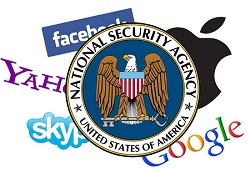New global research reveals that most global citizens favour enabling law enforcement to access private online conversations if they have valid national security reasons to do so, or if they are investigating an individual suspected of committing a crime.

The survey, commissioned by the Centre for International Governance Innovation (CIGI) was conducted by global research company Ipsos across 24 countries.
The study – titled the 2016 CIGI-Ipsos Global Survey on Internet Security and Trust – comes at a time when tech giant Apple is defying the F.B.I.’s orders to assist in accessing data stored in an iPhone owned by one of the two suspects who killed 14 people in San Bernardino, California, in December.
According to responses, most global citizens say law-enforcement agencies should have a right to access the online communications of its citizens (70%), especially those suspected of a crime (85%). As the Apple case unfolds today, 60% of Americans and 63% of internet users in 24 different countries think that companies should not develop technologies that prevent law enforcement from accessing the content of a user’s online data.
The survey of 24,143 users was conducted in 24 countries between the dates of November 20 and December 4, 2015 in: Australia, Brazil, Canada, China, Egypt, France, Germany, Great Britain, Hong Kong, India, Indonesia, Italy, Japan, Kenya, Mexico, Nigeria, Pakistan, Poland, South Africa, South Korea, Sweden, Tunisia, Turkey and the United States.
“The findings in this survey shine an important light on the nexus between trust, national security, and privacy in the increasingly dark and ungoverned space of the Internet,” said Fen Hampson, Director of CIGI’s Global Security & Politics Program & Co-Director of the Global Commission on Internet Governance. “Some of the most pressing challenges that the international community faces today live in this interconnection, and continue to illuminate the need for innovative governance solutions.”
The survey further found that, when someone is suspected of a crime, 85% of global citizens agree (49% strongly/37% somewhat) that governments should be able to find out who their suspects are communicating with online, including 80% of Americans who agree. Residents of Nigeria (95%) and Tunisia (93%) are most likely to agree with this position, while those in South Korea (67%) and Japan (70%) are by far the last likely to agree.
More contentious is the idea of whether companies should be allowed to develop technologies that prevent law enforcement from accessing the content of an individual’s online conversations. On this issue, 63% agree (26% strongly/36% somewhat) that companies should not develop this technology, including 60% of Americans. Those in China (74%) and India (74%) are most likely to agree, while only a minority of South Koreans (46%) believe companies should not do this.
“Public attention today is focused on national security and digital privacy. When it comes to national security, Americans and Canadians, as well as global citizens from 24 countries believe that digital privacy considerations come secondary to their own government’s pursuit of keeping their home country safe,” said Darrell Bricker, CEO of Ipsos Public Affairs & CIGI Senior Fellow.
QUICK FACTS ON ATTITUDES OF INTERNET USERS
On national security & trust:
70% agree that law enforcement should have a right to access content of citizens’ online communications for valid national security reasons.
Countries such as Tunisia (84%), Nigeria (82%), India (82%), Sweden (80%) and Great Britain (80%) are most likely to agree that law enforcement should have the right to access content of citizens’ online communications for national security reasons.
Seven in ten Americans (69%) and 65% of Canadians agree that law enforcement should have a right to access content of citizens’ online communications for valid national security reasons.
85% agree governments should be able to find out who their suspects communicated with online when suspected of a crime.
On national security & digital privacy:
63% agree (26% strongly/36% somewhat) that companies should not develop technologies that prevent law enforcement from accessing the content of an individual’s online conversations, including 60% of Americans, and 57% of Canadians.
Residents of North America (58%) are least likely to agree, while those living somewhere in the G-8 (61%), Middle East and Africa (63%), Asia Pacific (63%), Latin America (64%), Europe (64%) or BRIC (69%) are more likely to agree.
